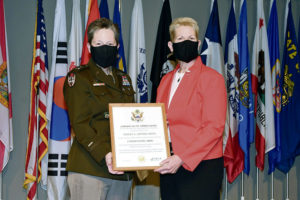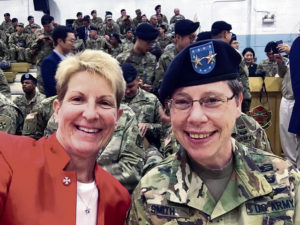
Since Maj. Gen. Tammy Smith, the military’s highest-ranking openly gay officer, came out in 2012, she has tried being an example of living authentically while also being a beacon of visibility to other Soldiers and their families.
It’s been nearly a decade since the “Don’t Ask, Don’t Tell” policy, or DADT, was repealed. The policy banned lesbians, gay men and bisexuals from serving in the military. Since then, Smith has gotten married, has been promoted not once but twice, and made history after coming out as a member of the LGBT community.
This week, Smith, who was special assistant to the assistant secretary of the Army for manpower and reserve affairs, retired after 35 years of service.
In 2012, her promotion to brigadier general grabbed news headlines. The general never sought to make history that followed her decision to include her wife, Tracey Hepner, during the promotion ceremony. It terrified her to come out as gay in such a public way, but she felt a responsibility to do it, she said.
On a personal level, she thought, “Why wouldn’t I include my wife in my promotion?” she said. After all, it is not uncommon for Soldiers to celebrate promotions with their loved ones.
The promotion ceremony
Smith held her ceremony a year after the repeal of DADT. The entire event flipped everything Smith ever thought on its head. Smith used to think, “How do we keep our lives a secret?” she said. For the first time, it wasn’t a secret. The journalists made sure of it.
Smith knew showing the world she loved Hepner wouldn’t be easy. But, she hoped it would “signal to other families they shouldn’t be afraid to have their families around them,” she said. “I had trepidation and although I didn’t go running into it, I knew it was the right thing to do.”
As difficult as it was for her, coming out publicly as gay “may not have been as easy for someone who was at a lower rank,” Smith said in an interview last week.

On paper, the ceremony followed all the standard protocols for such an event. Friends and family gathered, she raised her right hand and repeated all the lines asked of her. Then, at the heart of the event, two individuals that Smith loved pinned on her stars.
In her case, those individuals were her dad and Hepner, a woman who before DADT was repealed, she couldn’t openly love.
The ceremony did not start until four in the afternoon. By three, the initial news articles published. It was official. The Army leader who spent decades keeping her life a secret was publicly out to the entire world.
During the ceremony, Smith also noticed a public affairs officer briefing a three-star general about the news headlines. Knowing the Army was actively monitoring the media about her personal life may have been a minor detail, but it brought the weight of the situation into focus, she said.
The couple hadn’t told their families anything about the event being any different from other promotion ceremonies. As much as they longed to be treated like everyone else, they weren’t yet.
Before they could be, the married couple had to take that first step of publicly declaring their love, while also giving visibility to the LGBT community. Smith walked into the event terrified but hopeful that once it was over, a similar event could go easier for the next person.
“Visibility helps people rid their minds of stereotypes held about a person or group of people,” she said.
According to Smith, to see someone of a different group, such as the LGBT community, and associate them as “a real person,” she said, helps replace the stereotypes some people may have in their mind.
Smith’s fears of a negative public outcry never came that day, or in the years that have followed, she said. In fact, they still receive positive messages each day.
“It’s rare for Tracey or me not to hear from someone in a formation, or a family member [to a service member], or someone who knows someone in the military, either wanting to tell us about what they have read about us, or how we inspired them, or even asking us questions about their daughters getting married to another woman, wanting to do everything right for the wedding,” Smith said.
People first
It’s that positive direction toward acceptance that Smith also believes the Army is moving to, she said.
When Army leaders say people first, “it’s more than a slogan,” she said. “The Army is moving toward a place it has always been moving toward, and that is you can’t deny competent people. You can’t deny a good work ethic.
“The Army is taking the time to put a strategy behind what it means to put people first,” she added. “[The Army] wants you to feel included in this organization, so you want to stay and continue on this team.”
Soldiers reflect the diverse society they swore to defend, Smith said.
“As an all-volunteer force, Soldiers who come in reflect the type of people that live in our society, and I had the benefit of a 35-year view on this,” she said. “When I came in during the 80s, things were different for women and gay people, and now in 2021, the societal rules are different again.”
‘Honest and authentic’
One of the most rewarding parts of being married in the Army has also been the simplest joys. Things that may be trivial to others have meant the world to her and Hepner. One example has been living in on-post housing among other military families who are “going about their regular Army lives every single day,” she said.
“I have seen many changes over the 35 years that I have had the privilege to serve,” she said. “I think the change has been positive, and it has strengthened our military. It has made it more accessible, because of the society for which we serve. I like the direction that we are heading with our people.”
Through her experience, Smith has understood not only how to accept who she is but also become an authentic version of herself, she said.
“There’s a journey that takes place between first acknowledgment and being honest [with yourself],” she said. “People must find comfort and push back some of that internalized homophobia, and build a bit on the journey between honest and authentic.”
Smith has been on that journey for a decade following her choice to publicly come out, and “now I feel very comfortable in my authenticity,” she said.
“You don’t know how much pain you’re in until you are no longer in it,” said Hepner, who cofounded the Military Partners and Families Coalition, an organization that supports LGBT military partners and their families.
“We lived under the constraints of the law and it was painful,” Hepner said, regarding life before the policy was repealed. “I wish everybody could feel what it’s like to live authentically.”
That isn’t the case for everyone, she said. Many young Soldiers come into the Army at various points in that journey to living authentically. They may wonder if they can be honest with who they are and gauge where they are on the journey from honest to authentic.
“Overall, the Army is a place where you can do that,” Hepner said. “But, we can’t forget that even though the Army is inclusive, each person is still [somewhere] on that individual journey.”


